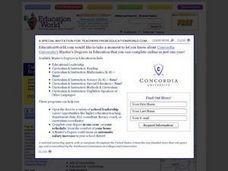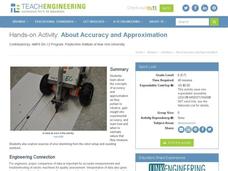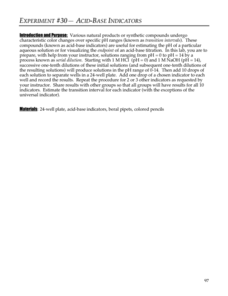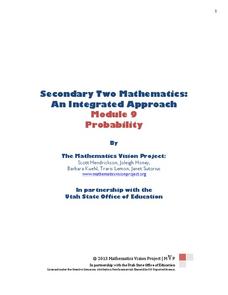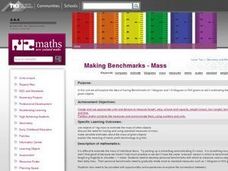EngageNY
Sampling Variability in the Sample Mean (part 2)
Reduce variability for more accurate statistics. Through simulation, learners examine sample data and calculate a sample mean. They understand that increasing the number of samples creates results that are more representative of the...
Curated OER
The Number Line
Represent, order, and compare rational numbers in order to practice placing them on a number line. Your class will use appropriate operations, methods, and tools to compute with real numbers. Then they must explain completely and clearly...
Curated OER
Nuts for Peanuts: Peanut Plants, Peanut Timeline, and Peanut-s-timation!
Students complete a timeline. In this peanuts instructional activity, students read A Short Peanut History and use this resource to make a timeline of the history of the peanut. Students can grow peanuts in the classroom or make various...
Berkshire Museum
Adopt a Schoolyard Tree
Help young scientists connect with nature and learn about trees with a fun life science lesson. Heading out into the school yard, children choose a tree to adopt, taking measurements, writing descriptions, and drawing sketches of it in...
Illustrative Mathematics
How Many Cells Are in the Human Body?
Investigating the large numbers of science is the task in a simple but deep activity. Given a one-sentence problem set-up and some basic assumptions, the class sets off on an open-ended investigation that really gives some context to all...
EngageNY
Sampling Variability in the Sample Mean (part 1)
How accurate is data collected from a sample? Learners answer this question using a simulation to model data collected from a sample population. They analyze the data to understand the variability in the results.
Teach Engineering
About Accuracy and Approximation
How accurate are robots? Groups draw lines by moving robots backwards and forwards by one rotation of the wheels. Using the appropriate formula, they determine the percent error in the length of the lines in relation to the calculated...
Pingry School
Acid-Base Indicators
Acid-base indicators are an essential part of any chemistry classroom. Individuals explore the color-changing feature of the important indicators in a vibrant hands-on activity. Using serial dilution, learners create solutions ranging...
National Security Agency
Awesome Area - Geometry and Measurement
Break out those math manipulatives, it's time to teach about area! Capturing the engagement of young mathematicians, this three-lesson series supports children with learning how to measure the area of squares, rectangles, and other...
Mathematics Vision Project
Probability
Probability, especially conditional probability, can be a slippery concept for young statisticians. Statements that seem self-evident on the surface often require a daunting amount of calculations to explicate, or turn out to be not so...
Houghton Mifflin Harcourt
Unit 1 Math Vocabulary Cards (Grade 4)
Use a set of 12 math vocabulary cards intended for fourth grade mathematicians. The topics of the cards include mostly place value concepts. Each sheet contains two cards; one with the word printed in bold text, and the other with the...
Houghton Mifflin Harcourt
Unit 3 Math Vocabulary Cards (Grade 4)
The five-page packet includes words particularly associated with multiplication. Each sheet has two cards on it; one with the word printed in bold text and another with the definition and example of the word
Houghton Mifflin Harcourt
Unit 4 Math Vocabulary Cards (Grade 4)
Looking for a set of math vocabulary cards for fourth graders? A 14-page packet of vocabulary words includes topics related to multiplication, division, and factor types. Each sheet has two cards on it: the top half has the word in bold...
Houghton Mifflin Harcourt
Unit 7 Math Vocabulary Cards (Grade 4)
Looking for vocabulary cards to expand your mathematicians' academic language? A set of 19 vocabulary cards focuses on terms dealing with probability, fractions, and decimals. Each sheet has a word card and a definition card.
Agriculture in the Classroom
Pumpkins... Not Just For Halloween
Celebrate fall with four pumpkin themed hands-on activities! After learning about pumpkins, scholars complete two activity sheets that reinforce estimation and word problems. They then plant pumpkin seeds and bake a pie in a bag.
EngageNY
Sampling Variability in the Sample Proportion (part 1)
Increase your sample and increase your accuracy! Scholars complete an activity that compares sample size to variability in results. Learners realize that the greater the sample size, the smaller the range in the distribution of sample...
EngageNY
Sampling Variability in the Sample Proportion (part 2)
Increase your sample and increase your accuracy! Scholars complete an activity that compares sample size to variability in results. Learners realize that the greater the sample size, the smaller the range in the distribution of sample...
Mathematics Vision Project
Module 8: Probability
It's probably a good idea to use the unit. Young mathematicians learn about conditional probability using Venn diagrams, tree diagrams, and two-way tables. They also take into consideration independence and the addition rules.
Curated OER
Multiply Whole Numbers and Decimals: Reteach
In this whole number and decimal multiplication worksheet, students review the three steps to multiply whole numbers and decimals. Students then find the products for the sixteen problems.
Curated OER
Making Benchmarks - Mass
Elementary schoolers predict the mass for different objects. Then, using objects of 1kg mass, they make a more precise prediction. Afterwards, they discuss the need for having and using standard measures of mass.
Curated OER
Measurement Masterpiece
Here is a good, cross-curricular measurement and estimation lesson. Learners practice measuring paper strips to create an art project. This is a great way to introduce the ruler, and how it used, to your students.
Curated OER
Teddy Bears and Friends
Children begin by making direct comparisons between objects and putting a number of objects into order according to length. They are also introduced to measuring with multi-link cubes which allows them to compare objects which cannot be...
Illustrative Mathematics
Why Randomize?
Your statisticians draw several samplings from the same data set, some randomized and some not, and consider the distribution of the sample means of the two different types of samplings. The exercise demonstrates that non-random samples...
Intel
Metric Madness
Scholars learn about the metric system and produce a presentation on how to convert within the metric system. They then develop a brochure in support of legislation requiring the use of the metric system.
Other popular searches
- Estimate by Rounding Off
- Rounding to Estimate
- Rounding to Estimate Sums
- Rounding to Estimate Product
- Using Rounding to Estimate




